unit 9cultivation整单元TMN
英语基础模块上册unit9cultivation
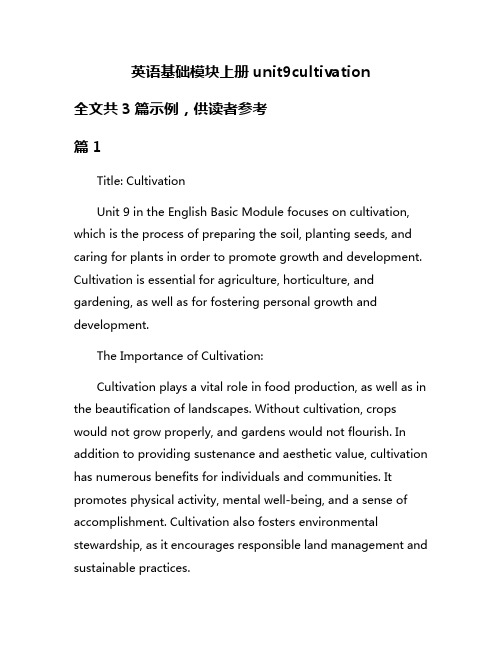
英语基础模块上册unit9cultivation全文共3篇示例,供读者参考篇1Title: CultivationUnit 9 in the English Basic Module focuses on cultivation, which is the process of preparing the soil, planting seeds, and caring for plants in order to promote growth and development. Cultivation is essential for agriculture, horticulture, and gardening, as well as for fostering personal growth and development.The Importance of Cultivation:Cultivation plays a vital role in food production, as well as in the beautification of landscapes. Without cultivation, crops would not grow properly, and gardens would not flourish. In addition to providing sustenance and aesthetic value, cultivation has numerous benefits for individuals and communities. It promotes physical activity, mental well-being, and a sense of accomplishment. Cultivation also fosters environmental stewardship, as it encourages responsible land management and sustainable practices.The Process of Cultivation:The process of cultivation involves several key steps, including preparing the soil, selecting seeds or plants, planting them, watering and feeding them, and protecting them from pests and diseases. Each step is important for ensuring the success of the cultivation process. Proper soil preparation, for example, helps plants establish strong roots, while regular watering and feeding supply them with essential nutrients. Pesticides and fungicides can be used to control pests and diseases that may threaten the health of plants.Cultivating Personal Growth:Cultivation is not only important for plants but also for individuals. Cultivating personal growth involves nurturing one's talents, skills, and potential in order to reach one's full potential. This process requires dedication, patience, and hard work, just like cultivating plants. By setting goals, developing new habits, and seeking out opportunities for growth, individuals can cultivate their personal development and achieve success in various areas of their lives.Cultivation in Education:Cultivation is also a key concept in education, where it refers to the process of nurturing students' intellect, skills, and character. Educators cultivate their students by providing them with the knowledge, resources, and support they need to succeed. By creating a positive learning environment, setting high expectations, and fostering a growth mindset, teachers can cultivate their students' academic and personal growth. Cultivation in education also involves promoting moral values, social skills, and emotional intelligence in students.In conclusion, cultivation is a fundamental process that plays a crucial role in agriculture, horticulture, gardening, and personal development. By understanding the importance of cultivation, mastering the process, and applying it to various aspects of life, individuals can grow and thrive in both their personal and professional endeavors. Cultivation is a journey of growth, transformation, and self-discovery that requires patience, dedication, and resilience. As we cultivate our gardens and ourselves, we become more connected to nature, to others, and to ourselves. Let us embrace the process of cultivation as a pathway to growth, fulfillment, and success.篇2Unit 9 CultivationIn Unit 9 of the English basic module, students will learn about cultivation, which is the process of preparing and tending to the soil in order to grow crops or plants. Cultivation is an essential part of agriculture and is crucial for providing food for the world's population. In this unit, students will learn about different cultivation techniques, tools, and practices.1. Types of Cultivation:- Traditional Cultivation: This method involves manually preparing the soil using tools such as hoes and shovels. Traditional cultivation is labor-intensive but is still widely practiced in many developing countries.- Mechanized Cultivation: This method uses machines such as tractors and plows to prepare the soil. Mechanized cultivation is more efficient and allows for larger areas of land to be cultivated in a shorter amount of time.- Organic Cultivation: This method involves growing crops without the use of synthetic chemicals or pesticides. Organic cultivation is becoming increasingly popular due to its environmental benefits and health benefits for consumers.2. Cultivation Tools:- Plow: A plow is a farming tool used to break up and turn over soil in preparation for planting. There are different types of plows, including the moldboard plow and the disc plow.- Hoe: A hoe is a gardening tool used to remove weeds and cultivate the soil. There are different types of hoes, including the Dutch hoe and the draw hoe.- Tractor: A tractor is a farming vehicle used to pull heavy machinery such as plows and seeders. Tractors are essential for mechanized cultivation.3. Cultivation Practices:- Crop Rotation: Crop rotation is the practice of planting different crops in the same field in succession. This helps to maintain soil fertility and prevent soil erosion.- Mulching: Mulching is the practice of covering the soil with materials such as straw or bark to retain moisture and suppress weeds. Mulching also helps to improve soil structure.- Irrigation: Irrigation is the process of supplying water to crops to ensure proper growth and yield. There are different irrigation methods, including drip irrigation and sprinkler irrigation.In conclusion, cultivation is a fundamental aspect of agriculture and plays a crucial role in feeding the world's population. By learning about different cultivation techniques, tools, and practices in Unit 9, students will gain a deeper understanding of how food is produced and the importance of sustainable farming practices.篇3Unit 9 Cultivation in the Basic English module focuses on various aspects of cultivation, including agriculture, gardening, and the development of skills and knowledge. In this unit, students will learn key vocabulary related to cultivation, practice their listening and speaking skills through discussions androle-plays, and engage in reading and writing activities to deepen their understanding of the topic.One of the key topics covered in this unit is agriculture. Agriculture is the practice of cultivating crops and raising animals for food, fiber, and other products. Students will learn about different types of agriculture, such as subsistence farming, commercial farming, and organic farming. They will also learn about the importance of sustainable agriculture practices in preserving the environment and ensuring food security for future generations.Another important topic covered in this unit is gardening. Gardening is the practice of cultivating plants, such as flowers, fruits, vegetables, and herbs, for aesthetic purposes or for consumption. Students will learn about the tools and techniques used in gardening, as well as the different types of gardens, such as flower gardens, vegetable gardens, and herb gardens. They will also learn about the benefits of gardening, such as physical exercise, stress relief, and connecting with nature.In addition to agriculture and gardening, students will also explore the development of skills and knowledge related to cultivation. This includes learning about the history of agriculture, the science of plant growth, and the role of technology in modern farming practices. Students will also learn about the importance of lifelong learning and continuous improvement in cultivating their skills and knowledge in this field.Overall, Unit 9 Cultivation in the Basic English module is designed to help students develop a deeper understanding of the practices, principles, and benefits of cultivation. By learning about agriculture, gardening, and the development of skills and knowledge in this field, students will be better equipped to engage with the world around them and make informed decisions about their own cultivation practices.。
语文版中职英语(基础模块-上册)Unit-9《Cultivation》ppt课件3讲课稿
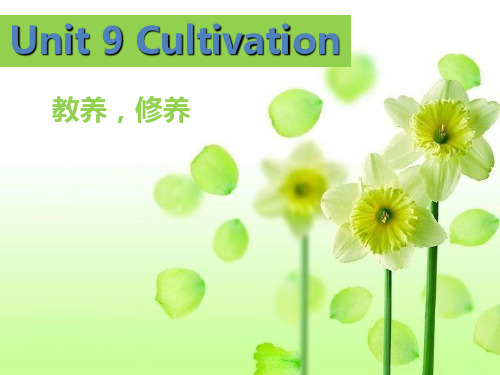
fight with others I will give you 3 minutes to read the text quickly, aWnhdatthheanpupseenseodmineltoehsaeesytheEixsntt?gelmishpewrords to express:
Unit 9 Cultivation
教养,修养
Warming up
WhSamt islinshge dWwoihWhnaeget?nwfyeoilllulinfsegeewel vitlehl riysyoehuxaphprapevyses?ion,
Q1. What will you do to make ห้องสมุดไป่ตู้our friends smile and feel happy?
fight with others
lose his temper
hammer a nail
keep his temper
pull the nail
get on well with others
Homework
1. please read the text 5 times. 2. Summarize and writes down phrases on your
exercise book.
Paragraph 1. There was once a little boy with a bad tempe.rHe often had fights withhis friends. One day, his father gave him a bag of nails and told him to hammer a naiinl to the fence every timehe lost his tempe. rThe boy listened tohis father and did what his father told him to do.
语文版中职英语(基础模块 上册)Unit 9《Cultivation》ppt课件2
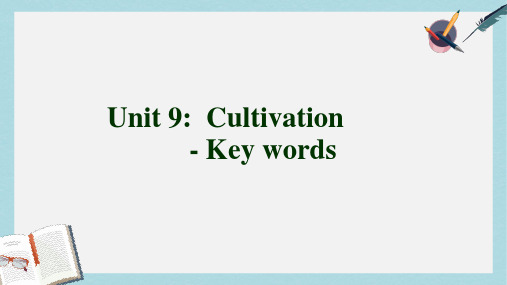
2019/7/31
最新中小学教学课件
13
thank
you!
2019/7/1
最新中小学教学课件
14
means
n. 方法,手段,(单复数同行)
meaning
n.意思
mean to do 打算做...
mean doing 意味着...
He didn't mean _t_o_h_u_r_t_ (hurt)you. but
saying like that means __h_u__r_ti_n_g__ you.
We'll go even if it rains.
Even if I fail this time, I would try again.
He will come on time even though it rains.
Even though you do not like it , you must do it.
3. drive - drove - driven
driver 4. in the following days随后几天里 5. be able to do sth. 能够
He has not been able to get there before dark.
I'll be able to speak English fluently next month.
6. take sb. by the hand抓住某人的手 catch sb. by the arm 抓住某人的膊
区别: by hand 手工
The mother take her baby by the hand to cross the street.
Unit-9--Cultivation-2
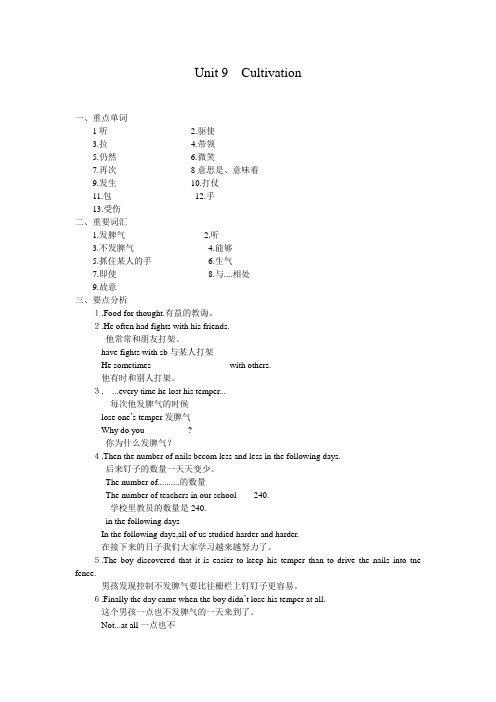
Unit 9 Cultivation一、重点单词1听_______ 2.驱使_______3.拉________4.带领_________5.仍然_______6.微笑_________7.再次________ 8意思是、意味着_______9.发生_________ 10.打仗________11.包________ 12.手_________13.受伤________二、重要词汇1.发脾气_______2.听_______3.不发脾气________4.能够_______5.抓住某人的手______6.生气________7.即使_______ 8.与....相处______9.故意________三、要点分析1.Food for thought.有益的教诲。
2.He often had fights with his friends.他常常和朋友打架。
have fights with sb与某人打架He sometimes__________________with others.他有时和别人打架。
3....every time he lost his temper...每次他发脾气的时候lose one’s temper发脾气Why do you__________?你为什么发脾气?4.Then the number of nails becom less and less in the following days.后来钉子的数量一天天变少。
The number of..........的数量The number of teachers in our school____240.学校里教员的数量是240.in the following days________In the following days,all of us studied harder and harder.在接下来的日子我们大家学习越来越努力了。
【语文版】中职英语基础模块上册:Unit 9《Cultivation》ppt课件

Activity 3 Tell us something about your friends
What do you usually do to make your friends smile and feel happy?
Warming up
Unit 9
Activty 4 Discussion
Four students in a group, each one has to interview the other groupmates. Did you quarral with your friends?
Now youd’oveitbargoakinen a _______. Jack: I’m very sorry about it. I
Questions 1. What happened in
the house? 2. What is Jack going
won’t _____________.a new one for you to do?
which picture do you like best?
Unit 9
What will you say when your friend doesn’t look well?
Warming up
Unit 9
Activity 2
Do you need friends? I’m sure your answer is “Yes, of course. Everybody does!” You
Keys: 1. A 2. A 3. A 4. B
Unit 9
Speaking Communication repairs
Activity 1 Read the dialogue and work in pairs to
语文版中职英语基础模快上复习教案Unit 9 Cultivation Revision
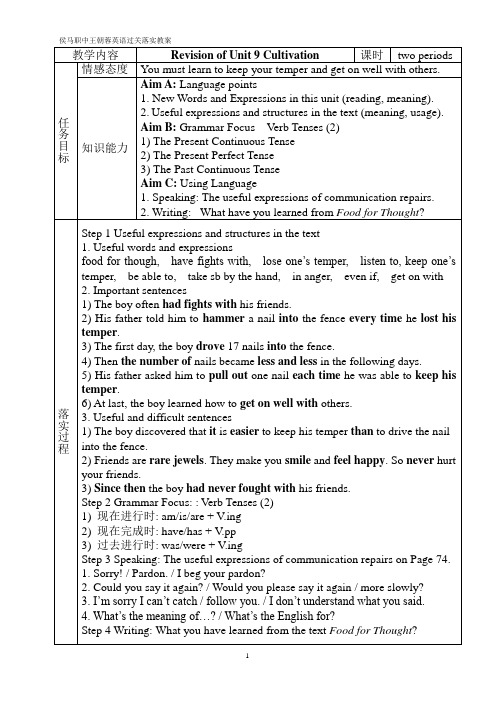
1. Sorry! / Pardon. / I beg your pardon?
2. Could you say it again? / Would you please say it again / more slowly?
教学内容
Revision ofUnit9 Cultivation
课时
twoperiods
任务目标
情感态度
You must learn to keep your temper and get on well with others.
知识能力
Aim A:Language points
1.New Words andExpressionsin this unit (reading, meaning).
落实过程
Step 1 Useful expressions and structures in the text
1. Useful words and expressions
food for though, have fights with, lose one’s temper, listen to, keep one’s temper, be able to, take sb by the hand, in anger, even if, get on with
When we are in trouble, we have tokeep calm.
When we are in anger, we have tocontrol our temper.
Unit9 cultivation 课件
Warming up ❖Activity 5
Unit 9
Free talk
❖ 2. Do you sometimes lose your temper when you are in trouble?
❖ Answers: ❖ Yes, I sometimes do. When I was in
which picture do you like best?
Unit 9
What will you say when your friend doesn’t look well?
Warming up
Unit 9
Activity 2
Do you need friends? I’m sure your answer is “Yes, of course. Everybody does!” You
Activity 3 Tell us something about your friends
What do you usually do to make your friends smile and feel happy?
Warming up
Байду номын сангаас
Unit 9
Activty 4 Discussion
Four students in a group, each one has to interview the other groupmates. Did you quarral with your friends?
❖ Mary: Oh, no! Jack , I told you not to touch _a_n_y_th_in_g__in_t_h_e_r_o_om.
新目标英语七年级下Unit9整单元课件
of medium height
of medium build
What does she look like?
She is thin,she is of medium height and medium build.
New words
look like short hair curly straight height thin heavy build
Talk, talk; show, show; let’s have a talk show! Tall, tall; short, short; he’s tall I’m short. Heavy, heavy; thin, thin; she’s heavy I’m thin. Jim is tall but Jack is short. Mike is heavy but Marry is thin. Lucy has brown hair not blonde hair. Lily has curly hair not straight hair. What does Tutu look like? Lovely? Lovely? Lovely!
•She has beautiful short, curly, blonde hair. •一头漂亮乌黑 的长发 •beautiful, long black hair.
What does he/she look like?
She has long hair. He has short hair. She has curly hair. She has straight hair.
……
a writer
short ,black hair a beard medium height wears a black coat is thinking ……
七年级英语下册unit9单元知识讲解
七年级英语下册unit9单元知识讲解Unit9Hasureeend?单元知识讲解一重点单词和词组ver prep在……期间pret n题;作业;项目test n测验;测试false ad错误的;假的nuber n号码;编号gegraph n地理学;地理spend v度过;消磨(时间)st prn≈ad 大部分(的);最多(的)ixture n混合;混杂;混合物their prn他们的;她们的;它们的little ad很少的;少量的v烹调;烹煮hange v变;改变everne prn每个人(都);人人(都)anthing prn 任何事(物);什么事(物)haveapart 举行晚会gshpping 去购物dsereading 读书talsh 访谈节目二重点难点讲解1hatdidudvertheeeend,Lu?这是由疑问词hat引导的特殊疑问句,表示询问“干什么?”句型结构与一般现在时的特殊疑问句一样:疑问词+一般疑问句例如:Huhdidupa? 你付了多少钱?ver在这个句子里表示“在……期间”,例如:illubeatheverhristas?圣诞节期间你在家吗?2hatabuturfriend?hatabut=habut,用以询问消息或征求意见,表示“怎么样”例如:I’hungrhat/Habutu?我渴了,你呢?3little,alittle,fe,afelittle和fe表示否定,意思为“很少”或”几乎没有”;alittle和afe则表示肯定,意思为“有一点,有一些”不过需要注意区别的是:little和alittle修饰不可数名词fe和afe修饰可数名词例如:Thereislittleininbttle,anugiveealittlein?我的瓶子里没有墨水了,你能给我点儿墨水吗?Hehasfefriendshere,hefeelslnel他这里没朋友,他感觉寂寞。
Thereareafeeggsinthebaset篮子里有几个鸡蛋。
语文版中职英语(基础模块 上册)Unit 9《Cultivation》1
friends Reasons for quarrels How to deal with Friend 1 Friend 2 Friend 3
Listening
❖Activity 1
❖Activity 2
❖Listen to the dialogues
and fill in the missing
words. anything in the room
❖ Mary: Oh, no! Jack , I tgolladssyou not to touch ______________ .
❖ Mary: Do it again?
❖ Jack: I mean I’ll buy ________.
Listening
❖ L09.wav ❖Activity 3 ❖Listen to the tape and choose the
polite and appropriate responsese.
❖ Keys: 1. A 2. A 3. A 4. B
Speaking Communication repairs
Activity 1 Read the dialogue and work in pairs to
act it out with your partner.
Mary: What’s wrong?
Free talk
❖2. Do you sometimes lose your temper when you are in trouble?
- 1、下载文档前请自行甄别文档内容的完整性,平台不提供额外的编辑、内容补充、找答案等附加服务。
- 2、"仅部分预览"的文档,不可在线预览部分如存在完整性等问题,可反馈申请退款(可完整预览的文档不适用该条件!)。
- 3、如文档侵犯您的权益,请联系客服反馈,我们会尽快为您处理(人工客服工作时间:9:00-18:30)。
5 lose his temper 发脾气
6 listen to 听,听从
7 tell sb. to do sth. 告诉,让某人做某事
ask sb. to do sth. 请某人做某事
8 food for thought 有益的教诲
Para2.
Unit 9
The first day, the boy drove 17 nails into the fence.
lead to 导致; 通向
Smoking can lead to cancer. 吸烟能导致癌症。
Unit 9
Words
Unit 9
in anger 愤怒地;生气地(=angrily)
He closed the door in anger. 他生气地关上了门。
even if 即使;尽管(引导让步状语从句)
Unit 9
Unit 9
Words
be able to 能够做…
The boy is able to sing English songs. 这个男孩会唱英文歌。
lead v. 引导;带领;领导
lead…to… 领到……
Shall I lead you to the teachers’ room? 要我领你去老师办公室吗?
Unit 9
1. Remember the key words and expressions. 2. Read and preview the text.
Unit 9
Thanks a billion!
Warming up
Unit 9
Activity 1
Do you need friends? I'm sure your answer is Yes, of course. You need friends when you play and when you work. If you have no friends, you will feel lonely.
the wound is as bad as a physical one. Friends are rare jewels.
和…一样 中间用adj./adv.原级
They make you smile and feel happy. So never hurt your
friends.
Food for Thought
Unit 9
❖ 1. What will you do to make your friends smile and feel happy?
❖ Answers: ❖ 1. show your friends how much you care for them. ❖ 2. lend an ear to them, share happiness and open your
Unit 9
Words
Unit 9
Words
Unit 9
fight /faɪt/ n./v. 斗争;打仗
fight with sb. 和某人打架
He often fights with his friends.
他经常和他的朋友打架。
temper /tɛmpə/ n.脾气
lose one’s temper 发脾气 The old man easily loses his temper. 这位老人容易发脾气。 keep one’s temper 控制脾气;不发脾气 He tried to keep his temper hearing the words. 听到这些话,他尽量控制住自己的脾气。
UUnniitt 49
Cultivation
英语基础模块(上册)
Teaching Procedures
1. Words and Expressions
1
2
2. Reading ①
Unit 9
3 3. Reading ②
4
4. Grammar
5
5. Writing
Words
Unit 9
Words
和…一样
Para3.
Unit 9
When you say some words in anger, your bad temper
生气地;愤怒地
will leave a scar just like the hole. Even if you say you’re
即使,尽管
sorry, the wound is still there. If you hurt a person with words,
Phrases
Unit 9
1 a little boy with a bad temper 一个坏脾气的小男孩
2 have fights with = fight with 和…打架 3 a bag of nails 一袋钉子
4 hammer a nail into the fence 把一个钉子钉入篱笆
把 …钉入…
Then the number of nails became less and less
…的数目
越来越少
in the following days. The boy found that it was easier
在接下来的日子里
to keep his temper than to drive the nails into the fence.
不见了
拉着他儿子的手
son by the hand and led him to the fence. He said, “You
领他到…
have done well, son, but look at the holes in the fence.
做得好
The fence will never be the same as it was before.
friends Reasons for quarrels
How to deal with
Friend 1
Friend 2
Friend 3
They must be close friends and get on well with each other.
Warming up ❖Activity 3 Free talk
Unit 9
Unit 9
period 2
Unit 9
Para3.
Unit 9
The days passed and the young boy was finally able to tell
能够…
his father that all the nails were gone. The father took his
Reading Comprehension
Unit 9
1 当你说一些气话的时候,你的坏脾气将留下像这个洞一样的伤痕。 2 即使你说对不起,伤痕依然在那。
Do you know how to get on with friends?
Warming up
Unit 9
Activty 2 Discussion
Four students in a group, each one has to interview the other groupmates. Did you quarral with your friends?
Even if I fail this time, I will try again. 即使我这次失败了,我还会再试试。
Unit 9
Words
get on with 与…相处
How do you get on with your classmates? 你和你的同学相处的怎么样?
Unit 9
Homework
heart to them.
Warming up
❖Activity 3
Free talk
Unit 9
❖ 2. Do you sometimes lose your temper when you are in trouble?
❖ Answers: ❖ Yes, I sometimes do. When I was in trouble or I had
3 not…at all 根本不…,一点也不…
The question is not difficult at all. 这个问题一点也不难。 The girl is not a student at all. 这个女孩根本不是学生。
Unit 9
Homework 1. Reading comprehension1-4. 2. Language study 1. 3. 练习册相关部分。
拔出
to keep his temper.
每次
能够 nails into the fence 把17个钉子钉入篱笆
11 the number of nails 钉子的数目
12 less and less
越来越少
比较级 + and + 比较级 越来越…
每年都会有大量的游客来参观长城。
重点难点
2 比较级 + and + 比较级 越来越…
little less and less 越来越少
many more and more
hot
hotter and hotter
interesting more and more interesting
Unit 9
重点难点
其后跟可数名词复数,作主语时,谓语动词用单数形式
The number of the students in our class is 52. 我们班学生的数量是52。
